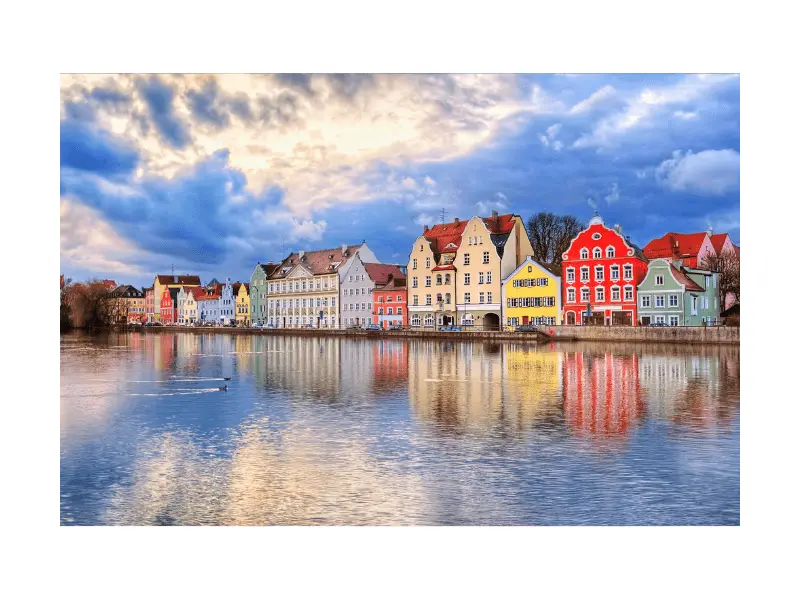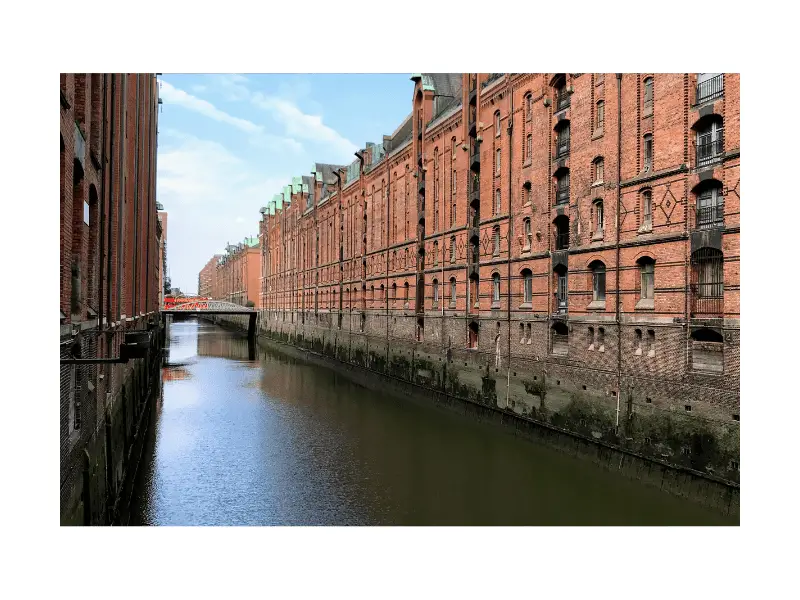Germany is a developed country with a robust economy and excellent infrastructure. Germany has been ranked as one of the best places in the world to live, work, and play.
Germany is home to many large international companies such as Adidas, Siemens, Volkswagen Group, Bayer AG, and BASF. Germany also has an abundance of natural beauty including the Black Forest region where you can enjoy skiing or hiking on mountain trails amid dense forests.
In this blog post, we will explore what Germany offers for digital nomads looking for a new place to call home! Let’s get started!
Internet Speed In Germany
Wifi Network
While Germany is one of the most advanced countries in the world, the WiFi coverage and speed can feel quite poor sometimes, especially when you step out of the big cities.
There is a notable difference in terms of price to connectivity when compared to other European countries such as Norway or Denmark.
WiFi hotspots are more than common in major cities as most bars, cafés, restaurants, and hotels can host the customers on their network. The internet speed for cities like Berlin, Hamburg, and Cologne can go up to 110Mbits/s.
You’ll also find public WiFi available in train stations, libraries, and airports. But again the speeds can vary and be as slow as 5Mbits/s even in some urban areas.
Lastly, fiber optic is still on its way in Germany but it is not impossible to find it equipped in an Airbnb or some hotels.
4G Coverage
On another hand, the coverage for mobile networks is overall amazing. 5G has begun spreading across the country but mostly around bigger cities and 4G networks are well established even in the more rural areas of Germany.
As shown by this map on Nperf.com, we can still see a fairly big difference between the different providers. T-Mobile is the leader in 5G to 4G+ coverage but fairly expensive ($20 to $30 per month) while O2 is the cheaper option (up to $10 per month) that has a remarkable 4G coverage in all parts of Germany.
If you intend to have steady video calls or upload videos as part of your work, you might want to go for a T-Mobile SIM card. But if you’re into traveling across the country and only need the bare minimum to work, O2 is the way to go.
Germany Digital Nomad Visa
Is there a digital nomad Visa available?
There is a sort of a digital nomad visa in Germany, in the form of a Freelance visa. The practical use of this visa is for digital nomads that would want to stay for longer than 90 days. The process can be quite lengthy as you will need to provide things like your financial plan, freelance work within the country, and lastly, show your self-sufficiency. Add to the pile, many basic and professional documents such as your resume, recommendation letters, portfolios, proof of German health insurance, and so forth. In short, there needs to be an economical interest for Germany if you intend to stay there for a while. You’ll find more information on these articles from Germany-Visa.com and NomadCapitalist.com.
The only alternative is for freelance artists and journalists to go for the Artist visa, only available in Berlin. Learn more about the process on AllAboutBerlin.com.
What Visa digital nomads usually get to visit the country?
Generally, most digital nomads tend to go for Schengen Tourist or Business visas as they are no other options for remote workers. These allow you to stay in the country for up to 90 days and the application is simpler than the freelance visa.
EU citizens in possession of a European Union country passport don’t need to apply for that visa. However, if you plan to stay longer than 3 months, you’ll need to register in the city’s town hall and apply for a visa.
Citizens from other countries have that luxury as well, such as the United States, Canada, South Korea, Japan, and more. Bear in mind that those visas do not typically allow you to work from Germany, but there are widely accepted as such.
What are the best spots in Germany for digital nomads?
Germany’s landscapes and type of lifestyle are very diverse. While planning a trip to this country, it is important to know what kind of experience you’re looking to have.
Is it the vibrant city and artistic lifestyle of Berlin? Do you like to be close to the sea during summer or the mountains during winter? In which case Hamburg and respectively the Bavarian Alps region might suit you.
You’ll probably be there for up to 3 months, therefore it is best to make the most out of it.
I compiled a list of the most interesting spot for digital nomads with a few recommendations on coworking spaces, here it is:
Berlin

No surprises there, Berlin is undeniably the crown jewel of Germany. Exceptionally diverse and modern, the city has a rich history and is also known as the home to many entrepreneurs and artists from around the globe.
Berliners are mostly fluent in English which makes it a perfect place to start your trip if you’re not a German speaker. Not the cheapest spot you could find by any means, but if you manage to find a room or Airbnb in the outskirts of Berlin, it can be affordable. There are a handful of coworking spaces with different vibes and communities such as D-36 Berlin, Betahaus, and Ahoy Berlin.
To finish on some weather notes, you will experience a fairly typical mild continental climate which means cold winters and moderately warm summers.
Munich

We step into the Bavarian state, to find the third-largest city in Germany known for its outstanding location on the north of the Bavarian Alps.
It is a city that dates back to the early 12th century and has nothing to envy its sister from the north, Berlin. You’ll find a plethora of activities, even more during the winter if you intend to ski, and the city life is more tranquil.
A lot of ex-pats and fellow nomads tend to live here, so meeting up with foreigners that speak English shouldn’t be a problem. The same goes for the popular attractions around and in Munich, people will usually speak decent to fluent English.
You’ll also find a couple of coworking spaces in Munich named WERK1 and Base Coworking.
Temperatures are roughly the same as in Berlin except during the winter where it can drop a few degrees more.
Hamburg

This is the destination for people who are looking for some “watery” activities as Hamburg is located in the north of Germany and lies on the River Elbe which directly goes into the Northern Sea.
Hamburg is also Europe’s third-largest port and has more than 2,400 bridges. A lot of the fun activities to have in Hamburg happen in the River Elbe. For example, you can experience a yoga session on a paddling board, but also wakeboarding, canoeing, and lastly sailing.
It is best to visit Hamburg during summer even if it is the tourist season. If you’re looking for a place to work from that is not a café, Code Working Space is a great start, they have all the necessities for any remote worker.
Cost of living in Germany
Germany is definitely on the cheaper side compared to its neighbors like France or the Netherlands, but it can be quite troublesome to find a good spot to live for not too much money.
Prices can differ drastically between housing in Munich and Berlin, and the most important thing to keep in mind is how close you choose to live in the city center.
The average cost of living for German residents is around ~$1200 per month and it has been increasing in the last few years.
For single housing in cities like Munich, Hamburg, and Cologne, the cost of living is between $800 to $900 per month.
That doesn’t include rent which can greatly vary, from $770 to $550 per month, depending on the apartment, Airbnb, or hotel location.
In Berlin, Leipzig, and also Dresden, things are a little bit more affordable, especially housing since the range goes from $450 to $750 per month.
Meals, dinners, and lunches can be as cheap as 9 dollars in most restaurants. The price of a beer is about 3 dollars. I wouldn’t recommend eating in restaurants too often, grocery shopping is much better for your wallet.
Finally, public transportations are quite affordable, a bus or subway ticket is $2.5. Weekly and monthly plans are always available and it will save you a bit of money. You can travel between cities very fast by train and for long distances, you can expect prices from $40 to $90.
To conclude:
Germany is a great country for digital nomads. Germany has plenty of coworking spaces with different vibes and communities, the cost of living is cheaper than France or Netherlands, English speakers are easy to find in Germany due to its ex-pat community, Germany enjoys an average temperate climate (mostly), Germans enjoy cheap meals at restaurants (less than 10 dollars) and public transportations are affordable as well. If you’re looking for somewhere new to explore your remote working lifestyle, Germany might be it!
